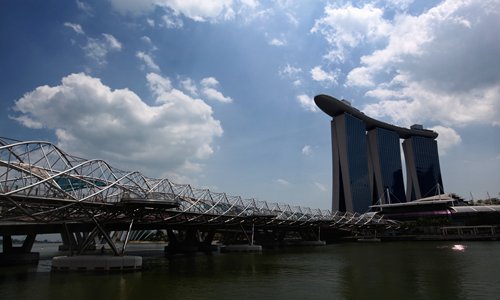HOME >> BUSINESS
Singapore ready to build an open and trustful trade environment with China
Source:Global Times Published: 2019/6/18 20:28:40

A view of the Helix Bridge and the Marina Bay Sands hotel in Singapore Photo: VCG
An open, trustful, multilateral and rule-based economic environment is the future of regional cooperation in the Asia-Pacific area, especially under the current strained global trade relations, Chee Hong Tat, Singapore's senior minister of state for trade, industry and education, said on Tuesday during the CCG World Trade Roundtable.
The change in the global trade system is also presenting opportunities for countries in the Asia-Pacific region to reform the old system and build a new system using new regional initiatives including the Regional Comprehensive Economic Partnership (RCEP) and the Belt and Road Initiative (BRI), according to experts at the roundtable.
Chee noted that the current trade dispute is jeopardizing the trade system, by damaging the trust that a trade system can be non-binary and win-win. Therefore, the old system, including the WTO framework, needs to be updated and reformed.
"The WTO has been around for quite some time, and like any organization it needs to be updated," Chee said. "It is not static. The key step is to convince the main stakeholders that changes in the WTO are necessary, and that this can enlarge the pie for everyone to share."
Xu Hongcai, deputy director of the Economic Policy Commission, agreed that the increasing tension in trade means that Singapore and other regional countries can seize the opportunity to work with China and explore new forms of cooperation, especially with new free trade zones and the BRI.
"As a financial hub in Southeast Asia, Singapore can serve as a platform for the internationalization of renminbi products, and it can work with regional free trade zones including the Hainan Free Trade Zone to establish a free trade area reaching other countries in Southeast Asia. It can also work with financial institutions in China and BRI countries to explore more opportunities," Xu said.
Fair and open trade not only allows for more room for growth; it can also encourage more confidence in deepening cooperation in trade and globalization, as other initiatives such as the BRI can tighten global cooperation and improve the rule-based trade environment, experts at the roundtable said.
"China is working to lift restrictions on foreign investment and if it can keep the BRI open, transparent and welcoming, it will greatly encourage trust in conducting trade with China, and it will build a bigger pie for everyone to share," Chee observed.
The BRI can be an important opportunity for countries to keep communications open and build a platform for discussion and identify common interests, according to experts at the roundtable.
As a traditional regional hub for manufacturing and finance in the Asia-Pacific region, Singapore is ready to work as the catalyst to improve the trade environment.
"Unlike China, which has a huge domestic market and large scope for consumption, Singapore is a small nation whose trade volume is three times the size of its GDP. We can't depend on the domestic market in the same way as China," Chee said, noting that Singapore is ready to work with China and the ASEAN countries to build an open and rule-based environment that is beneficial to all.
Posted in: ECONOMY